Editor-in-Chief Of Iranian Daily Prosecuted Following Hijab Survey
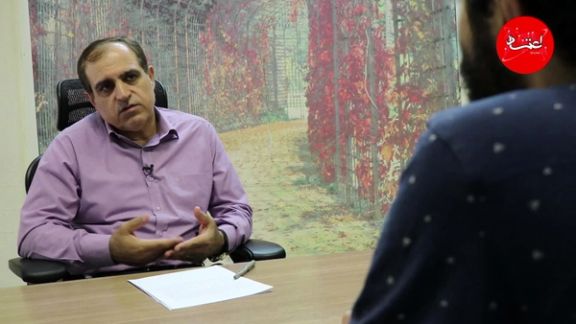
Mehdi Rahmanian, the Editor-in-Chief of Shargh newspaper, has been deemed a criminal after the publication of a survey indicating that most Iranian are opposed to compulsory hijab.

Mehdi Rahmanian, the Editor-in-Chief of Shargh newspaper, has been deemed a criminal after the publication of a survey indicating that most Iranian are opposed to compulsory hijab.
Akbar Nasrollahi, the spokesperson for the Judiciary's Political and Media Crimes Courts, stated that the charges against Rahmanian involve the "dissemination of false information," based on the complaint filed by the Tehran Prosecutor regarding the "misleading headline" of an 84% opposition to compelling women to observe hijab, dated October 25, 2023.
On October 24, Shargh reported the results of its survey, reporting an 84% opposition among the public to mandatory hijab for women. The survey involved the participation of over 12,300 individuals.
The survey was released following the approval of a bill titled Chastity and Hijab by the Iranian parliament, indicating intentions to tighten restrictions in this regard.
Following the court session, addressing the complaint of the Supervisory Board of Press against Rahmanian, Nasrollahi noted that a verdict would be issued subsequently.
Simultaneously, the results of the survey were removed from Shargh's website.
Despite four decades of implementing the policy of compulsory hijab, Iranian women, especially after the recent nationwide protests in Iran, have openly opposed the policy by publicly removing their mandatory headscarves.
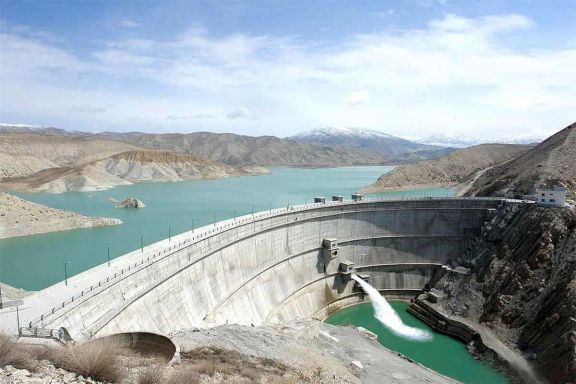
Official statistics indicate a severe decline in the water reserves of Iran’s dams due to the overgeneration of hydroelectric power in the summer of this year.
Iran has been severely affected from water shortages and prolonged droughts for two decades, while grappling with a substantial electricity deficit in summers and gas shortage in winter.
ISNA reported on Sunday, December 17, that the statistics on the operation of the country's reservoir dams indicate that the water volume in the reservoirs is only 40% full.
Official statistics detail that while the volume of water inflow into the dams increased by 7% compared to the same period last year, the water outflow from the dams increased by 22%. Consequently, their water reserves have decreased by one billion cubic meters.
None of the government statistics or official statements explain why the Ebrahim Raisi Administration allowed a 22% increase in the discharge of dam water. However, details from the Ministry of Energy's data on power generation show that the government has compensated for some of the summer electricity shortage by significantly and urgently increasing hydroelectric power production from dams.
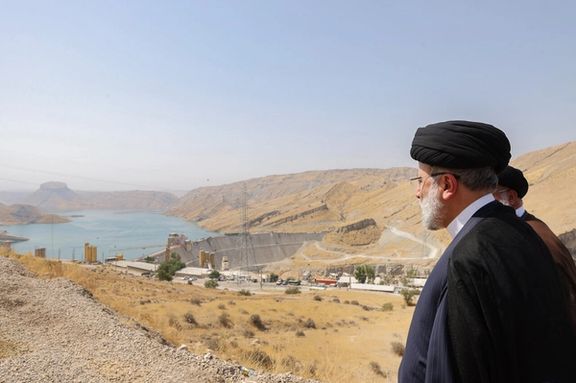
In recent years, Iran has been unable to achieve its electricity generation growth targets, leading to a deepening of the country's electricity shortfall.
In the first seven months of the current fiscal year, started on March 22, Iran launched around a 1,000 megawatts of new power plants, with only 35 megawatts being from solar and wind, and 116 megawatts from "combined cycle" with relatively high efficiency.
This is despite the Raisi Administration’s plan to launch over 6,000 megawatts of new power plants this year, with half of them being renewables.
The latest report from the Ministry of Energy shows that the hydroelectric power generation from the country's dams has experienced a 57% jump in the current Iranian year (beginning March 21) compared to the same period last year, reaching over 17 trillion watt-hours.
This significant increase in hydroelectric power generation comes while the water inflow into the dams this year has only grown by 7% compared to last year. As a result, the government has emptied the reservoirs of the dams to solve part of the summer electricity deficit, exacerbating the country's water crisis.
The monthly report from the Ministry of Energy also indicates that while the government had targeted the launch of 6,000 megawatts of new power plants, only 15% of that has been achieved in the eight months of the current Iranian year, with almost all new power plants being thermal and operating with low efficiency, using natural gas, Mazut, and diesel.
In recent weeks, the highly use of mazut in power plants has led to severe air pollution in the country, especially capital Tehran. This is a dirty fuel banned in most countries.
According to a confidential report, prepared by the oil ministry and obtained by Iran International, Iran used 45 million liters per day of mazut and 117 million liters of diesel in last winter due to gas shortages.
For this year, the government had targeted the launch of over 2,600 megawatts of solar and wind power plants, but only 1% of that has been realized in the eight months of this year.
While Iran boasts 300 sunny days annually, the contribution of solar and wind energy to the country's electricity production remains at approximately half a percent, with atomic energy making up just over one percent.
Deputy Minister of Energy Mahmoud Kamani's announcement on December 15 highlighted an electricity imbalance of 12,000 megawatts this summer, predicting a further 5% increase next year.
For comparison, Turkey surpasses Iran, with 35 times more solar and wind power production and renewable electricity generation capacity 22 times greater than the Iran’s nuclear power plant. Over a quarter of Turkey's electricity is derived from water sources, while this figure for Iran is 6%.
Iran's electricity issue, causing dam water supplies to drop below half, signals a serious problem. The intricate relationship between water resource management and energy production exacerbates the scarcity of both vital resources.

An Iranian official at the Department of Environment has raised concerns over the precarious situation of the Iranian, or Asiatic cheetah as numbers have dwindled to several dozen animals.
Hassan Akbari, the Deputy for Natural Environment and Biodiversity at the Iranian Department of Environment, expressed grave concerns on Monday emphasizing the immediate need for conservation efforts, pointing to natural and human-induced threats, particularly road accidents, as significant dangers to the species.
Despite 52% of recorded cheetah deaths being attributed to road accidents, the Iranian Department of Environment has yet to implement measures to enhance road safety for these endangered creatures. In other countries, protective measures such as road fencing and the construction of wide overpasses in natural habitats have been adopted to ensure the safe passage of animals.
However, Iranian officials cite a lack of budget for erecting fences or installing speed cameras in the main habitat of the Asiatic cheetah. Akbari underscored the urgency of addressing the challenges, stating, "Given the natural and human-related dangers, such as road accidents, we have very limited time to rescue the cheetah from the brink of extinction, and it does not seem that we have more than four to five years to preserve the valuable species."
Akbari also warned that any delay in reinforcing habitat protection or enhancing prey populations would significantly reduce the chances of saving the cheetah from extinction.
Once dispersed across vast areas of Asia, the Iranian cheetah is now listed on the International Union for Conservation of Nature (IUCN) Red List as a species on the brink of extinction, confined to remote regions in central Iran. Despite ongoing efforts to protect this endangered species, concerns about the Asiatic cheetah's extinction have escalated.
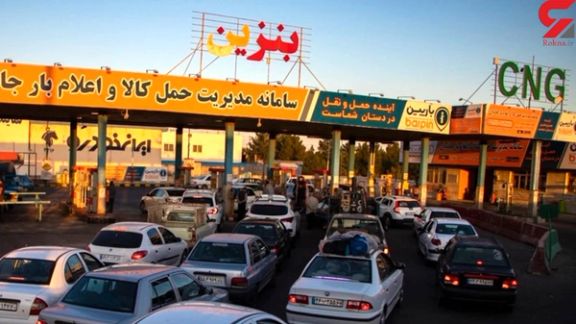
The cyberattack that crippled gas stations across Iran on Monday was claimed by a hacking group that Iran has previously accused of having links to Israel.
The hacking group "Gonjeshk-e-Darande" or Predatory Sparrow announced the attack on X, claiming that they took out “a majority of the gas pumps throughout Iran.” Tehran cites a “software problem" as the cause behind the nationwide shutdown and says about 90 percent of the stations will be back on track by the end of the day.
Oil Minister Javad Owji earlier told Iranian state TV that services had been disrupted at about 70% of Iran's petrol stations and that outside interference was a possible cause. Reza Navar, spokesperson for Iran’s petrol stations association, said 60 percent were out.
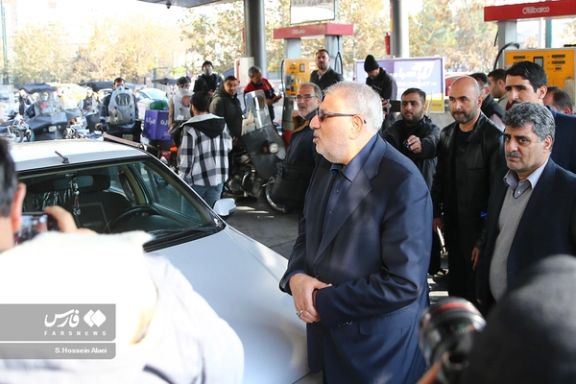
The hacking group, whose nom de guerre is a wordplay in reaction to Iranian state-backed cyber-crime outfit Charming Kitten, said in statements in Persian and English that “the cyberattack comes in response to the aggression of the Islamic Republic and its proxies in the region.” They added, “We will impose cost for your provocations. This is just a taste of what we have in store.”
Addressing Iran’s Supreme Leader, the group said, “Khamenei, playing with fire has a price.”
The attack comes as Iran’s proxies like Hezbollah in Lebanon and the Houthis in Yemen have stepped up attacks against Israeli and US targets on the backdrop of the war in Gaza. Hamas declared war on Israel on October 7 after its militia invaded by air, land and sea, killing 1,200 mostly civilians and taking 240 captives. Iran supports Hamas but says it did not play any role in the Islamist militants' October 7 terror attack.
As measures “to limit potential damage to emergency services,” the hacking group said it “delivered warnings to emergency services across the country before the operation began, and ensured a portion of the gas stations across the country were left unharmed for the same reason, despite our access and capability to completely disrupt their operation.”
The group rose to prominence as a hacktivist two years ago for a similar cyberattack on fuel distribution centers across Iran on the eve of the second anniversary of the bloody suppression of the November 2019 protests. In a separate incident, they claimed responsibility for hacking the state railway company.
Last year, the group garnered attention for successfully penetrating the computer systems of major steel companies in Iran. They went on to share videos and images showcasing their hacking prowess and operation. At the time Israeli military correspondents, who are regularly briefed off-the-record by senior Israeli officials, hinted that Israel was behind that hack, according to the Times of Israel.
Iran has a history of cyber incidents, with one of the most notable being the Stuxnet computer virus, believed to have been developed by the United States and Israel. The Stuxnet virus, discovered in 2010, was used to attack an Iranian uranium enrichment facility, marking the first publicly known instance of a virus being utilized to sabotage industrial machinery.
In the past few days, two refineries in Iran burnt down. Less than a week after a devastating fire engulfed the Birjand oil refinery in east Iran, another refinery in Esfahan (Isfahan) faced a similar fate as it succumbed to flames on Saturday, December 16. In the December 10 incident, all 18 hydrocarbon tanks at the Birjand oil refinery in South Khorasan were consumed by flames.
Hadi Beiginezhad, a member of the Energy Committee in the parliament, criticized the authorities for not learning from the past similar attacks, saying that administrations do not pay attention to the infrastructure of the fuel distribution network.
"We don't know if this incident is technically a hack or if a hack has occurred at all. But what we do know is that the infrastructure of product distribution in the country is facing issues because the enemy has been able to take advantage of our negligence, both in terms of investment and infrastructure,” he said, noting that “the enemy has learned well which channels to strike... They have infiltrators and can easily carry out such sabotage operations."
Iran has witnessed a series of industrial accidents, including fires in oil facilities, petrochemical plants, and industrial centers in recent years. The incidents are often attributed to outdated technology, the use of substandard equipment, and the aging and deterioration of structures. While authorities have not provided comprehensive explanations for these incidents, they have attributed several high-profile sabotage attacks to Israel. However, Israel has not officially claimed responsibility for any of the incidents. Notably, numerous unexplained explosions and fires have occurred at various Iranian military, nuclear, and industrial facilities, including pipelines and refineries, since mid-2020. On January 28, a significant fire erupted at an Iranian military industrial factory, suspected to be the result of a drone strike in Esfahan.
Every now and then, the Islamic Republic announces that it has busted Israel-linked groups planning sabotage operations against its facilities. Israel has neither denied nor confirmed the allegations.
Some Iranians speculate on social media that the hacking of the gas stations can serve as an excuse for the government to increase gasoline prices that are the cheapest in the world after Venezuela. The Iranian government sells one liter of gas for 3 US cents, or 10 cents a gallon, as a long-existing subsidy for domestic consumers. However, the Oil Ministry announced that the disruption at fuel stations is in no way connected to a change in gasoline prices.
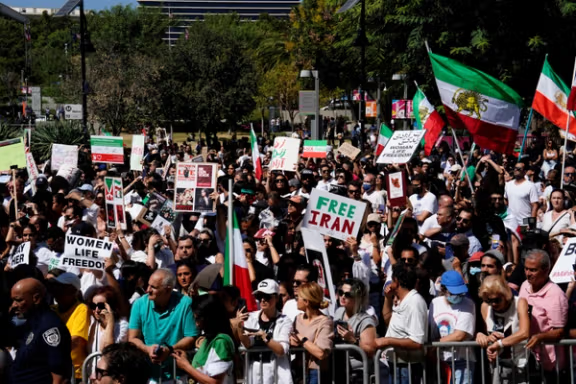
Jailed Iranian dissident Zohreh Sarv, who ended her hunger strike following a call from Iran’s exiled Prince Reza Pahlavi, has sent a message of unity for the opposition.
In a letter from the women’s ward of Evin Prison in Tehran to Prince Pahlavi, Sarv thanked him and expressed her gratitude to her fellow inmates, including Nobel Peace Laureate Narges Mohammadi, and other activists "of various political inclinations" who supported her during her ordeal.
“Once again, inmates at Evin’s women's ward showed that factional and political affiliations of individuals have no importance when it comes to helping each other and that we are all like a family supporting one another,” Sarv, an Instagramer wrote. She has been jailed twice since 2019 for “insulting the Supreme Leader”, “propaganda against the regime” and acting against national security.”
“My duty towards my friends and comrades [in prison] is has become even more important because of the all-round support they displayed,” she added. “Like pieces of a puzzle that only make sense when they are placed together, every one of us, irrespective of our [political] orientation, will contribute to the freedom of Iran. There is no power greater than unity.”
She began her hunger strike on November 23 to protest authorities' constant efforts to bring new false charges against her and their denial of her rights, including conditional release or prison furlough for medical treatment.

Former Crown Prince Pahlavi urged Sarv to end her hunger strike. “You have demonstrated your resolution and patriotism in Islamic Republic’s captivity. End your hunger strike. This struggle [against the regime] will continue until the freedom of Iran and requires you to be in good health,” he urged Sarv in a tweet on Wednesday.
Sarv reportedly took an overdose of tranquilizers after pressure from the Revolutionary Guards' Intelligence to collaborate with them against other opponents of the regime. She declared her intent to continue her hunger strike to the end after treatment at the hospital and returning to prison.
Sarv’s message comes following a major controversy on Iranian social media following the Nobel Peace Prize ceremony held earlier this month. Monarchists or constitutional monarchists criticized remarks by Mohammadi’s husband Taqi Rahmani on the sidelines of the ceremonies. He argued that Iranians do not want a sudden revolution, preferring slower change. This is the buzzword for reforms rather than an overthrow of the clerical regime, monarchists and other proponents of regime change claim. The debate got ugly at times with personal attacks and rhetorical accusations by the two sides. Some monarchists went as far as condemning the Nobel Committee for awarding Mohammadi, whom they accuse of an advocate for reforms rather than a regime change.
Unlike many of his supporters, Prince Reza Pahlavi has not condemned the Norwegian Nobel Committee’s decision to award Mohammadi.
“The Norwegian Nobel Committee awarding Narges Mohammadi this year’s peace prize is a recognition of the Women, Life, Freedom movement and this national struggle for freedom,” Prince Reza Pahlavi said in a tweet on October 6 following the Nobel Committee’s announcement of the Peace Prize for the Iranian activist without directly congratulating Mohammadi.
“I hope that this award will encourage a shift in Western policy toward offering tangible means of maximum support for the Iranian people and their national revolution and not serve merely as a symbolic gesture meant to deflect attention from appeasement of this criminal regime,” he added.
The crown prince’s wife, Yasmin Pahlavi, however, recently criticized Mohammadi when she was reported to have a brief phone call with Angelina Jolie from prison.
Social media users who claim to be ardent supporters of the Pahlavi monarchy have been relentlessly attacking Mohammadi and even accusing her of complicity with the regime due to her support of reformists in the past and voting in elections that they had boycotted.
Mohammadi has recently declared that she no longer believes that the Islamic Republic could ever be reformed and would never vote again.
The division between the monarchists and some others in the opposition has escalated in recent weeks with both sides exceedingly targeting each other on social media.
“It is really disappointing when you see many opponents of the regime who cannot bear the continuation of the Islamic Republic are either resorting to the same repressive methods [as the regime] or are facilitating the regime's plans to create discord,” well-known caricaturist Nikahang Kowsar said in a tweet.
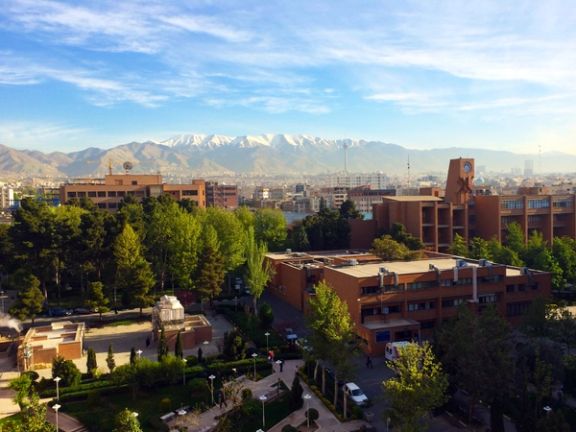
In the wake of intensified political pressures by authorities, several distinguished professors from Sharif University of Tehran have reportedly migrated to institutions abroad.
Amirkabir Newsletter, a prominent Iranian student news platform, revealed on its Telegram channel that what began as an extensive emigration by students has now extended to include important university professors.
Last week, Abdolreza Simchi, a renowned professor in the Faculty of Materials Science and Engineering at Sharif University of Technology, disclosed that he is now employed at the German Fraunhofer Research Institute, where he has been working since June 2023.
Vahid Hosseini, a former professor in the Faculty of Mechanical Engineering at Sharif, has relocated to a Canadian university, while Mohammad Ali Maddah Ali, previously the head of the Blockchain Working Group at the Digital Economy Headquarters of the Vice Presidency for Science and Technology, has emigrated to the United States to continue his research in the field of blockchain.
Nima Asadian, who concluded his 12-year professorship at Sharif University in January 2022, has opted to work in laboratories abroad, and Abbas Heydarnouri, the former director of the Smart Software Engineering Laboratory at Sharif University, is now residing in the United States.
Stidents at Sharif University of Technology, recognized as one of Iran's premier institutions, have played a central role in recent protests against the Islamic Republic. The government's response to the protests has included widespread detention and summoning of students, along with issuing judicial and disciplinary sentences. The suppression has now extended to professors who supported the protests, resulting in some being suspended from their positions.